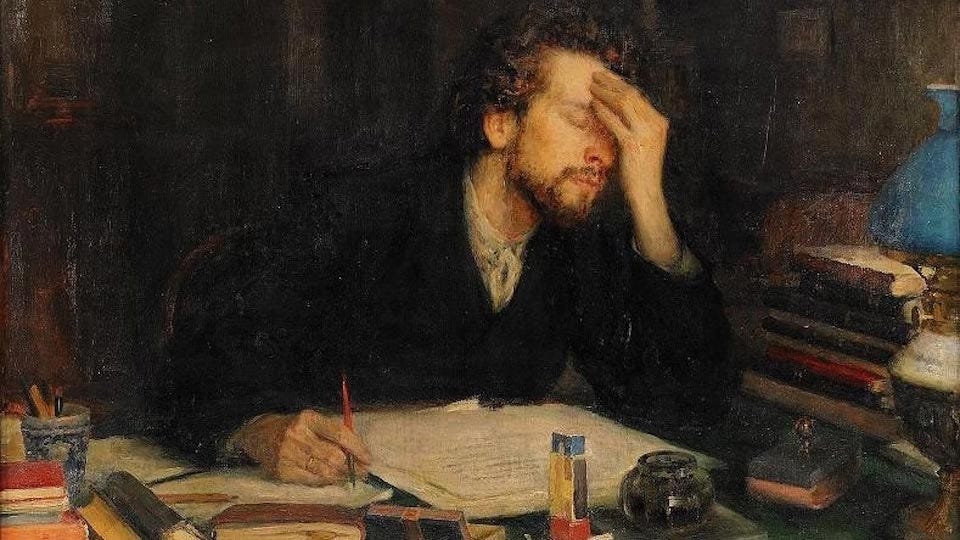✍️ Why We Struggle With Writer’s Block
A Bonus Quick-hit Post
This is the first of what may or may not be a new series of Quick-hit “update” posts – snippets that follow up on previous posts with information so juicy, I can’t wait to share it with you…
I’ve danced around definitions of writer’s block in these pages, always self-admittedly never quite nailing it. That includes this post: Paper, Paper Every Where, Nor Any Drop of Ink. But today, I’m happy to report, I’m come several steps closer – and I wanted to tell you right away.
During research for my next post, I stumbled on an article that seems to define writer’s block fairly precisely. I found out that in fact, psychologists across the ages have explored possible causes. A few of them even suggested possible cures – and they are not what you’d expect.
Originally, I cut and pasted huge swaths out of the New Yorker article How to Beat Writer’s Block by Maria Konnikova (https://www.newyorker.com/science/maria-konnikova/how-to-beat-writers-block) to the point that I was certain the plagiarism police would be knocking on my office door for even just thinking about it. So rather than do that, I’ll break down the article into its core arguments:
Writer’s block does indeed have psychological causes rather than purely being a lack of creativity
Almost all writers who reported having writer’s block to the researchers struggled with motivation, and almost all had “low levels of positive and constructive mental imagery”. However, the source of their lack of motivation and positivity differed.
That is to say, blocked writers are unhappy for various reasons including symptoms of depression, anxiety, self-doubt, perfectionism, helplessness, and/or an “aversion to solitude”, to name a few (we’ve talked about some of these already).
There are four general types of conditions:
Anxiety and stress, which led to self-criticism
Anger or irritation towards others, which led comparing their work to others
Apathy leading to disengagement, which led to a lesser ability to “be creative” and feelings of being too constricted by “the rules”
Angry, hostile, and disappointed (perhaps the stereotypical “bitter writer”?), which led to a need for external motivation including attention and reward
However, although the obvious answer is to address the underlying psychological issues to become a well adjusted writer again, it turns out the opposite is true. Being more creative leads to being more creative, which in turn can help improve our psychological conditions.
Confusing? Sure is. But what I think it means is this: the way to beat writer’s block is to just write, write as if nobody is watching, and write with wild abandon. And where have we heard all that before?
A dream journal can be the perfect tool, according to the article (and I believe it). By definition, nobody is reading that journal but you. Subconsciously, you can “let yourself go” because you know the words you write down right now will never see the light of day. You are truly writing as if nobody is watching.
“Such escapes allow writers to find comfort in the face of uncertainty; they give writers’ minds the freedom to imagine, even if the things they imagine seem ludicrous, unimportant, and unrelated to any writing project,” Konnikova wrote.
Nailed it.
Long-time readers will recognize that these are also all concepts I’ve explored in these pages. I can’t tell you how happy I am to have stumbled onto this article and finally nailed down the roots of writer’s block! It’s also somewhat self-affirming that I was at least on the right track. And hey – if writer’s block teaches us anything, is that we all could use more self-affirmation in our lives.
If you’re at all interested in the roots of writer’s block, I highly recommend you read the article. (You’ll recognize the closing paragraphs when you read next Tuesday’s posts…)
https://www.newyorker.com/science/maria-konnikova/how-to-beat-writers-block
Until next time, keep writing with wild abandon! (And now we know why…!)
~Graham
Know anyone with writer’s block? Please share this post with them!
email me if you get lost.





I know you ended by recommending that we read the article, but I can’t help feeling that I don’t really need to now. I’m so torn!
You nailed it, Graham.